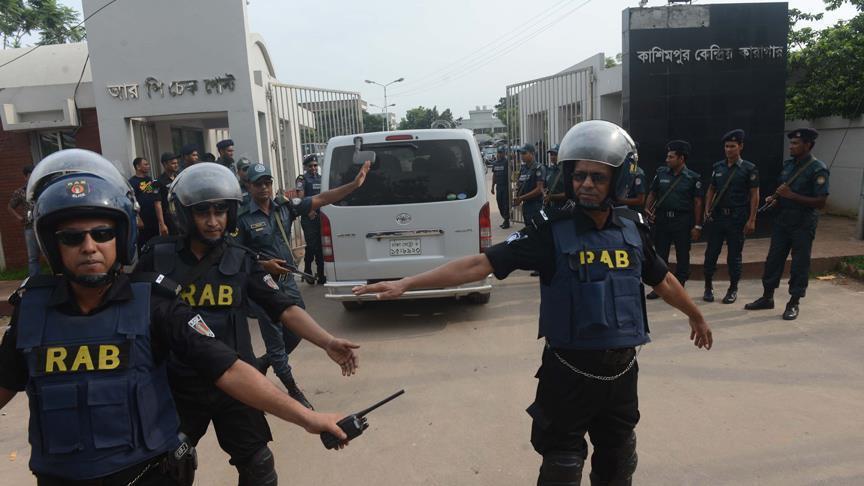Bangladesh Jamaat leader hanged for alleged war crimes
Mir Quasem Ali is the 6th leader of Bangladesh’s Jamaat-e-Islami to be executed for alleged war crimes

By Mainul Islam Khan
DHAKA, Bangladesh
Mir Quasem Ali, 63, a former top businessman and one of the top leaders of Bangladesh’s Jamaat-e-Islami, was hanged Saturday for allegedly committing war crimes 45 years ago, during Bangladesh’s 1971 War of Independence.
Proshanto Kumar Banik, the senior superintendent of Kashimpur Prison, confirmed to the media that Mir Quasem was hanged at around 10:30 p.m. local time (1630GMT).
Security has been tightened around the jail in Kashimpur’s Gazipur district, near the capital Dhaka.
Earlier, on Aug. 30, Bangladesh’s top court dismissed Mir Quasem’s appeal to review the death penalty it had previously handed down.
The same Appellate Division bench judged Mir Quasem's appeal on March 8, upholding the death sentence given by the International Crimes Tribunal – a special domestic court – in November 2014.
After the dismissal of his review petition, the only remaining life-saving option he had was to seek presidential clemency, a step he declined to take.
The jail authorities began preparing for his execution after he chose not seek clemency.
According to local media, Mir Quasem's wife Khondoker Ayesha Khatun said on Saturday after meeting her husband, “Those responsible for hanging him will not win.’
Pakistan condemns Bangladesh's hanging of Mir Quasem
Pakistan Saturday condemned the “flawed” judicial process and hanging execution of Mir Quasem Ali, a top leader of Jamaat-e-Islami of Bangladesh, for crimes allegedly committed before December 1971.“The act of suppressing the [Bangladeshi] Opposition, through flawed trials, is completely against the spirit of democracy”, Pakistan’s Foreign Ministry said in a statement. “Ever since the beginning of the trials [of Mir Quasem Ali], several international organizations, human rights groups, and international legal figures have raised objections to the court proceedings, especially regarding fairness and transparency, as well as harassment of lawyers and witnesses representing the accused.”
The government of Bangladesh should uphold its commitment, as per the Tripartite Agreement of 1974, wherein it "decided not to proceed with the trials as an act of clemency," the statement added. “Recriminations for political gains are counterproductive”.
Pakistan believes that matters should be addressed with a forward-looking approach in the spirit of reconciliation, said the statement, also offering deepest condolences to Mir Quasem’s bereaved family members.
Jamaat-e-Islami Pakistan also condemned the execution, accusing Bangladesh’s Prime Minister Haseena Wajed of eliminating her political rivals in the guise of justice for so-called war crimes.
Siraj ul Haq, the Pakistan group’s head, also offered condolences to Quasem’s family, calling the hanging on the basis of false accusations a travesty of justice.
He accused the government of Pakistani Prime Minister Nawaz Sharif of not raising the issue on international forums.
“The silence of Pakistan’s government on the executions of Jamaat-e-Islami leaders in Bangladesh is highly condemnable. They are being hanged for their pro-Pakistan stance against Indian intervention in then-East Pakistan in 1971, but our government is doing nothing for them,” he charged.
Adding to the criticism, Human Rights Network (HRN), a Karachi-based rights group, declared the execution of Mir Quasem “politically motivated”.
Intekhab Alam Suri, the HRN president, said the so-called international war crimes tribunal set up by the Bangladeshi government ignores international standards of justice, and had been acting as a government tool to eliminate its political rivals.
Asma Jehangir, a senior lawyer and former general secretary of the Human Rights Commission of Pakistan (HRCP), warned that the executions of political leaders on the basis of insufficient evidence would further polarize Bangladeshi society.
Mir Quasem is the sixth leader of Bangladesh’s Jamaat-e-Islami who has been executed for alleged war crimes. He is the fifth top Jamaat leader whose death sentence for war crimes was upheld in the final verdict.
On Aug. 30, Amnesty International also asked Bangladesh’s government to cancel the execution.
Mir Quasem Ali was born to Mir Tayeb Ali and Rabeya Begum in Manikganj, near the capital Dhaka, on December 31, 1952. He joined Islami Chhatra Sangha in 1967 while studying at Chittagong Collegiate School.
Mir Quasem Ali was a director of Islami Bank, and also chairman of Diganta Media, which owns Diganta television. He was the founder of Ibn Sina Trust and director of the NGO Rabita al-Alam al-Islami, according to Wikipedia.








